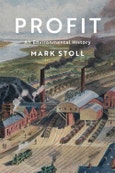Profit - getting more out of something than you put into it - is the original genius of homo sapiens, who learned how to unleash the energy stored in wood, exploit the land, and refashion ecosystems. As civilization developed, we found more and more ways of extracting surplus value from the earth, often deploying brutally effective methods to discipline people to do the work needed.
Historian Mark Stoll explains how capitalism supercharged this process and traces its many environmental consequences. The financial innovations of medieval Italy created trade networks that, with the European discovery of the Americas, made possible vast profits and sweeping cultural changes, to the detriment of millions of slaves and indigenous Americans; the industrial age united the world in trade and led to an energy revolution that changed lives everywhere. But when efficient production left society awash in goods, a new sort of capitalism, predicated on endless individual consumption, took its place.
This story of incredible ingenuity and villainy begins in the Doge’s palace in medieval Venice and ends with Jeff Bezos aboard his own spacecraft. Mark Stoll’s revolutionary account places environmental factors at the heart of capitalism’s progress and reveals the long shadow of its terrible consequences.
Table of Contents
Illustrations
Acknowledgments
Introduction
1 How It Started
2 Trade and Empire
3 The Wonders of Coal and Machines
4 Age of Steam and Steel
5 Conserving Resources
6 Buy Now - Pay Later
7 Stepping on the Gas
8 Selling Everything
9 The Rise and Globalization of Environmentalism
Conclusion: Profit - Capitalism and Environment
Notes
Index








